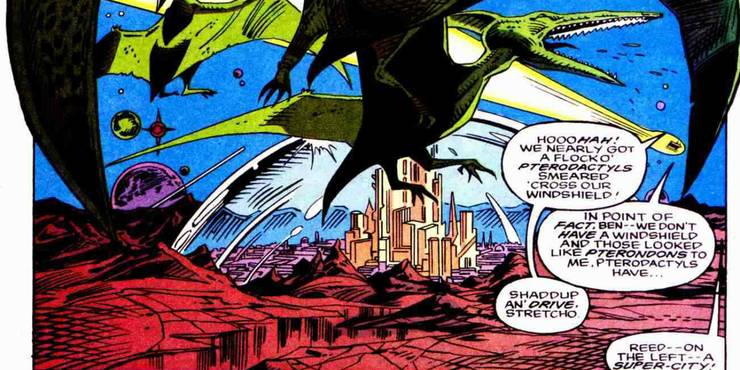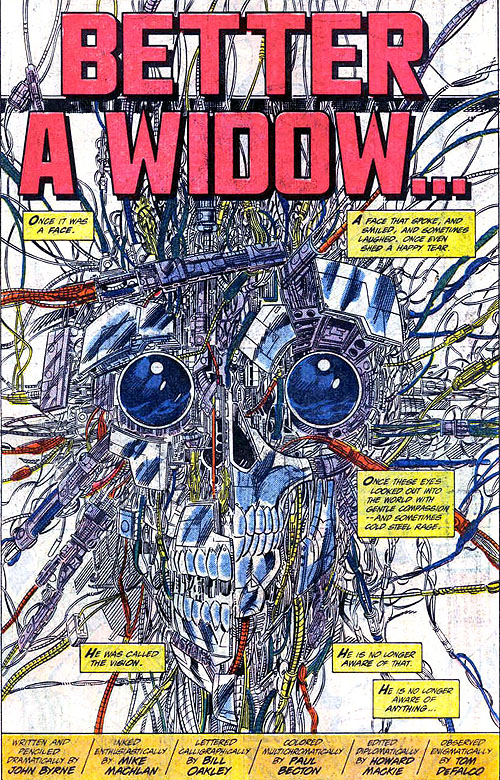In the comics, THE BOYS features most superheroes as having the public image of the Avengers and Justice League, but in reality, they are serial killers, rapists and sadists with total immunity to prosecution. The Boys are a covert black-ops squad charged with supposedly 'policing' the superheroes, but the only way to police them is to kill them and The Boys start with low level heroes before making their way up the chain, except the methods they use to infiltrate and assassinate make them as monstrous as their enemies. It's all played for dark comedy and it comes to a pretty definitive and bloody conclusion.
I didn't enjoy it. But I respected it because THE BOYS forced a lot of later superhero writers to ask themselves: why is Superman a good and kind soul? Why doesn't Tony Stark abuse his wealth and power? Why isn't Captain America a jingoistic nutjob? Why are the Avengers a solid peacekeeping operation instead of a fascist regime? Why isn't Batman a murderous sociopath? In a post-BOYS era, writing these characters as they'd generally been written before but with actual reasons for their moral standards became a very important challenge.
Writers like Geoff Johns highlighted how, much like Tom Welling on SMALLVILLE, Superman lived a high celebrity and action fuelled lifestyle -- but he would generally go home to his wife or his parents at the end of the day for a family dinner and would till the land, care for cows, write newspaper stories. Even Garth Ennis, who created THE BOYS, found himself treating Superman with respect when writing him in three issues of his HITMAN comic where Superman declares, "I'm not a warrior. I'm not a soldier of any kind. I'm simply doing what I can to help." Journalism is part of Clark's public service, empowering people with knowledge. Superman rejects Max Landis' proposition that he is to rule the Earth or save it. Superman is not above the Earth, deciding its fate or dictating its course; he is a citizen of Earth. He is a man of the people.
Writers like Ed Brubaker and Greg Rucka had written Batman as a sociopathic isolationist who became so brusque and abusive that Alfred quit as butler and moved in with Robin. But subsequent writers like Grant Morrison highlighted how Batman, from his very early days, has been a teacher, mentoring the Robins, Batgirl and more and ultimately built a family around himself that would ultimately bring him back to being a man with great compassion for the weak and a nobility that makes him the equal of any superhuman. Writers like James Tynion IV and Scott Snyder would capitalize on how Batman had an instinct for building family (and publishing lines).
Writers like Mark Millar, Brian Michael Bendis and Matt Fraction changed Tony Stark quite a bit. In the 90s comics with Kurt Busiek, Tony Stark was written as a very blandly heroic, milquetoast hero. Millar, Bendis and Fraction gave Stark the Robert Downey Jr. arrogance and bombast, but they also highlighted how at the end of the day, Stark doesn't actually have any superpowers. Now-disgraced writer Warren Ellis also added to Tony Stark's persona a sense of guilt: Stark used to build weapons that were stolen by terrorists and killed millions; he is now ashamed and forever seeking redemption, hence his curtailed misuse of his privilege and money.
Captain America didn't really need too much adjustment after THE BOYS, but the comics took more care to have Cap frequently at odds with SHIELD and the United States government, at times going to all out war. But the seeds were actually sewn back in the 80s issues of DAREDEVIL by ridiculously jingoistic writer Frank Miller. Miller, like Ennis with Superman, seemed to find something greater in himself when writing Captain America.
An issue of DAREDEVIL has a corrupt general trying to steer Cap away from investigating an illegal supersoldier program, telling Cap that Cap's "loyalty" should have him defer to any order from any US Army commander. Captain America replies, "I'm loyal to nothing, General, except the Dream," a line that has defined the character since then with writers like Mark Gruenwald and Mark Waid making it clear that Captain America represents the American ideal and never the American government.
I've always liked Geoff Johns as a writer especially on Superman. A writer like Garth Ennis declares that superheroes like Superman are absurd because their decency of character is completely at odds with how people with power behave in the real world and creates superheroes that are more realistic. Why would a god on Earth work at a newspaper?
A writer like Geoff Johns, however, acknowledges that it's absurd that Superman has a day job -- but then he embraces it, reinforces it, creates new reasons for it -- because Geoff Johns understands that superheroes are myth and myths are always ridiculous. It is the ridiculous part of the myth that embeds it into the imagination along with the meaning behind the absurdity -- and realizing that ridiculous myths endure long after the realistic creations have been set aside.
Superheroes would not be as rich and meaningful as they are today without THE BOYS comic books. And we should grapple with all the questions raised by THE BOYS. But ultimately, I don't believe that we should make superheroes more like us, as bitter and as angry and as cynical and as corrupt as ourselves. We should not make Quinn, Wade, Rembrandt and Arturo argumentative, cynical, chaotic, abusive, violent or indifferent in order to reflect our own failings. We should not kill them off one by one to demonstrate how we too would perish during sliding. We should make ourselves more like them; we should adopt Quinn's resourcefulness, Wade's empathy, Rembrandt's love for life and the Professor's wisdom.





